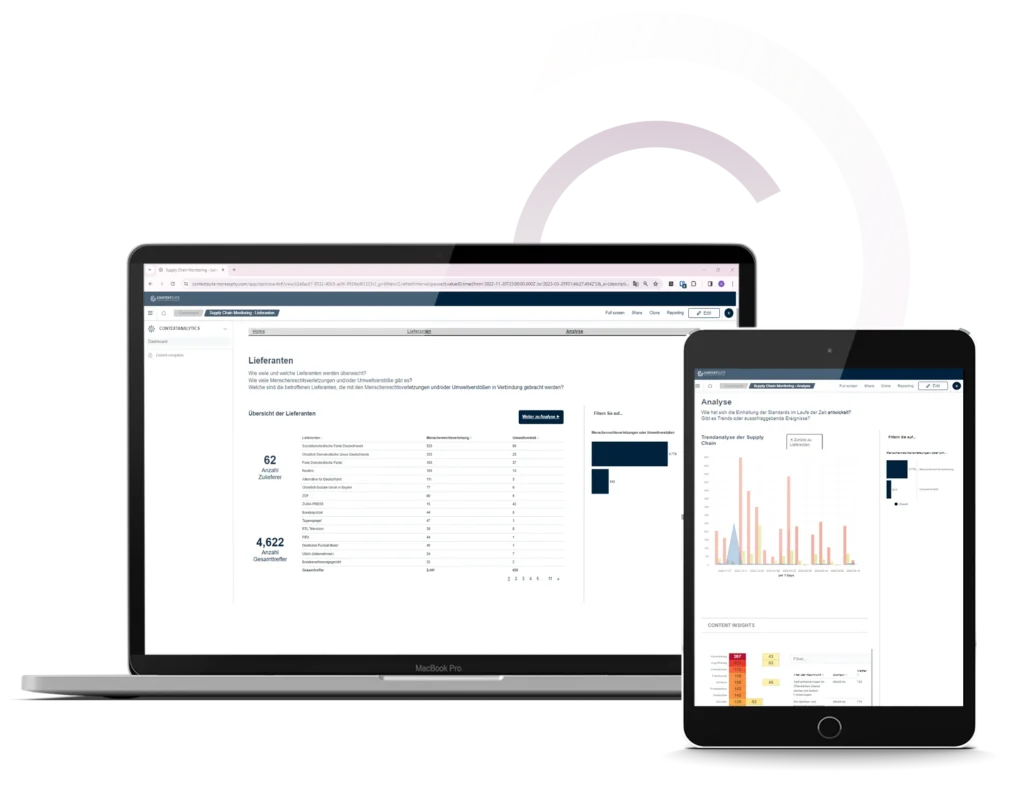- 26.07.24
- Reading time: 5 Minuten
The Supply Chain Act:responsibility for the entire supply chain
The Supply Chain Act, officially known as the Supply Chain Due Diligence Act (LkSG), has obliged German companies to ensure human rights and environmental standards in their global supply chains since 2023. The aim of the Supply Chain Act is to prevent violations of human and environmental rights from the extraction of raw materials through to delivery to the end customer. The law requires companies to comprehensively review and continuously monitor their supply chains in order to identify and minimize risks.
What is the Supply Chain Act and what are its objectives?
The Supply Chain Act obliges companies to check their supply chains for violations of human and environmental rights and to take measures to prevent such violations. The Supply Chain Act is based on the UN Guiding Principles on Business and Human Rights, which were adopted in 2011 and apply to all companies and states worldwide.
The objectives of the Supply Chain Act are clearly defined:
Schutz der Menschenrechte:
Protection of human rights:
Companies should take appropriate measures to ensure that no human rights violations such as forced labor or child labor occur in their supply chain.
Umweltschutz:
Environmental protection:
Companies must also minimize environmental risks that may arise from their business activities or those of their suppliers.
Abhilfemaßnahmen:
Remedial measures:
Victims should have access to effective complaints bodies and compensation.
Who is obligated?
The Supply Chain Act affects all companies based in Germany with at least 1,000 employees, as well as their branches abroad and temporary workers who are deployed for longer than six months. Groups with affiliated companies and a total of more than 1,000 employees are also included.
It is important to emphasize that small and medium-sized enterprises (SMEs) can also be indirectly affected. For example, if an SME is a supplier to a large company that falls under the Supply Chain Act, it must ensure that it complies with the client’s human rights and environmental requirements. An infringement can not only have legal consequences, but can also cause considerable reputational damage that can quickly spread worldwide.
LkSG for the SME next door?
Although the LkSG is aimed at companies with 1,000 or more employees, it also affects small and medium-sized companies. Find out more in our white paper Simply implement the LkSG: The CLARIUS.LEGAL guide for SMEs.
You are currently viewing a placeholder content from HubSpot. To access the actual content, click the button below. Please note that doing so will share data with third-party providers.
More InformationWhat are the deadlines and requirements for implementation?
The Supply Chain Act has been in force since January 1, 2023 and will be binding for all affected companies from January 1, 2024. With regard to the reporting obligation, BAFA will check for the first time on January 1, 2025 whether the reports are complete. Until then, all companies, regardless of the number of employees, have time to prepare their reports.
To ensure compliance with the Supply Chain Act, companies must take the following measures:
Abgabe einer Grundsatzerklärung:
Issuing a policy statement:
This must be publicly accessible and set out the company's commitment to respecting human rights and environmental standards.
Durchführung einer jährlichen Risikoanalyse:
Carrying out an annual risk analysis:
Companies must identify and assess potential and existing risks along their entire supply chain.
Etablierung eines Risikomanagementsystems:
Establishment of a risk management system:
Based on the risk analysis, suitable measures must be introduced to prevent and rectify violations.
Einrichtung eines Beschwerdeverfahrens:
Establishment of a complaints procedure:
Affected persons must have the opportunity to report violations.
Dokumentation und Berichterstattung:
Documentation and reporting:
All measures and results must be continuously documented and reported annually, both internally and to the responsible supervisory authority.
What sanctions and consequences are possible?
Violations of the Supply Chain Act can have serious consequences. The Federal Office of Economics and Export Control (BAFA) can impose fines of up to two percent of the company’s global annual turnover. Serious violations may also result in exclusion from public tenders for up to three years.
Furthermore, reputational damage can have immense economic consequences. A known violation of human or environmental rights can significantly affect the trust of customers, investors and business partners.
Who is responsible in the company?
Responsibility for compliance with the Supply Chain Act lies with the managing director or company management. It is crucial that the management level understands the importance of the law and provides the necessary resources and structures to fulfill the legal requirements.
Important questions and answers on the Supply Chain Act
The Supply Chain Act is intended to ensure that companies check their supply chains for human rights and environmental violations and take measures to prevent such violations.
All companies with at least 1,000 employees, including their affiliated companies and temporary workers who have been employed for more than six months.
Companies must issue a policy statement, carry out an annual risk analysis, establish a risk management system, set up a complaints procedure and continuously document and report.
Fines of up to two percent of global annual turnover and exclusion from public tenders for up to three years are possible.
The management or company management is responsible for compliance with the Supply Chain Act.
By using IT-supported compliance solutions, companies can manage the complex requirements efficiently and economically.
The Supply Chain Act represents a new legal challenge that companies should not underestimate. A careful and proactive approach is crucial to minimize legal, financial and reputational risks. Companies that act early and implement suitable measures can not only fulfill the legal requirements, but also make an important contribution to improving global human rights and environmental standards.
We are happy to support you in implementing the Supply Chain Act!
Take a look at our Business Partner Monitoring LkSG or arrange a non-binding consultation with our compliance experts directly.


